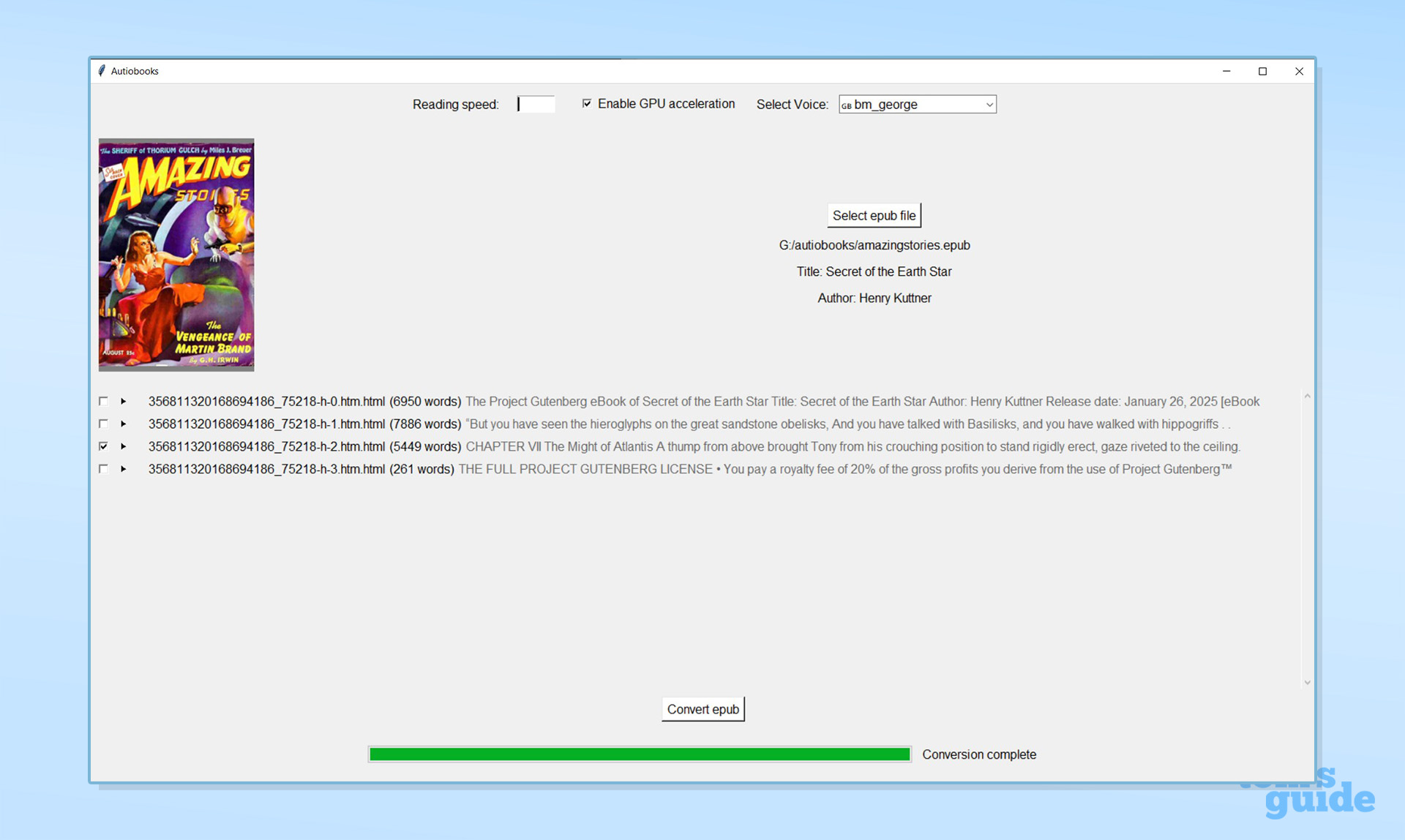I tried the open source AI tool that creates audiobooks for free — here's my verdict
Open source tech lets anyone create their own audiobooks on a budget

The growing popularity of podcasts has spurred an equivalent uptick in audiobook use. The ability to listen to your favorite content on the go — in the car, the commute or while working out — has driven the market to a $7 billion industry, which is no small thing.
But so far it’s mostly been controlled by mega corps like Amazon with its Audible service.
Things may be about to change in a big way. A new project called Autiobooks, based on a text-to-speech AI model called Kokoro, has just landed. The project lets anyone create an audiobook for free on their home computer, using nothing more than an epub text file of their favorite title.
Until recently, this sort of process has been impossible unless you had access to huge cloud computing resources, but now open source tools are opening up the market, which is great news for the end user.
The catch
The downside of this free tech is you get what you pay for. The packaging is very rough and ready, and you need some technical experience and a decent computer to get the most out of the app, all of which can put a lot of people off.
And currently there’s no way you’ll match the quality and phrasing of the commercial voices you get from services like ElevenLabs.
I spent some time testing out Autiobooks recently, to see if open source is really ready for prime time. The simple answer is almost, but there’s still a way to go.
The first hurdle for most people will be having to install the package using a command line on their computer. Until somebody comes up with a one-click solution, hopefully soon, this will remain a step too far for most folk.

The good news is once it's installed, the app fires up a nice simple graphical interface, which makes it very easy to create an audiobook out of your epub files. All you have to do is add your selected file to the app, and the tech will identify and display a list of chapters for you to choose from.
You can either select everything, or choose specific chapters, at which point press go and the conversion begins.

The nice surprise is the speed. Even on my fairly modest home computer I managed to convert a full PG Woodhouse ebook downloaded from Project Gutenberg in a mere five minutes. That’s a one gigabyte audiobook which provides around four hours of audio entertainment. Very impressive!
Unfortunately the voices, while good, are nowhere near a match for voices from the big commercial services. They’re a quantum leap better than a year ago, but still lack the full range of human emotion and phrasing we expect and enjoy. But it’s obviously not going to be long before they’re on a par with the big boys.
Verdict?
If audiobooks are your thing, or you’re looking for a good quick way to fill your commute time on a budget, then Autiobooks is a great solution.
Just don’t expect premium quality voice phrasing or flexibility, and be prepared to get your hands dirty setting it all up.
More from Tom's Guide
- OpenAI CEO Sam Altman just shared a massive update on what's next for ChatGPT
- Adobe Firefly Video is here to take on Sora with new AI video generator
- I tested Gemini 2.0 vs Perplexity with 7 prompts created by DeepSeek — here's the winner
Sign up to get the BEST of Tom's Guide direct to your inbox.
Get instant access to breaking news, the hottest reviews, great deals and helpful tips.

Nigel Powell is an author, columnist, and consultant with over 30 years of experience in the technology industry. He produced the weekly Don't Panic technology column in the Sunday Times newspaper for 16 years and is the author of the Sunday Times book of Computer Answers, published by Harper Collins. He has been a technology pundit on Sky Television's Global Village program and a regular contributor to BBC Radio Five's Men's Hour.
He has an Honours degree in law (LLB) and a Master's Degree in Business Administration (MBA), and his work has made him an expert in all things software, AI, security, privacy, mobile, and other tech innovations. Nigel currently lives in West London and enjoys spending time meditating and listening to music.
You must confirm your public display name before commenting
Please logout and then login again, you will then be prompted to enter your display name.










